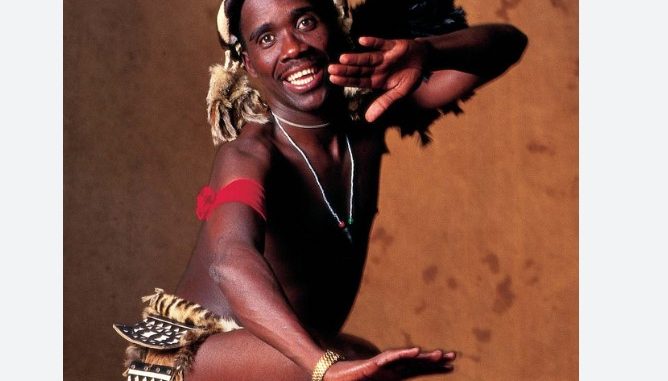
Mfaz’ Omnyama (born Thokozani “Mfaz’ Omnyama” Zulu) was one of the most influential figures in the Maskandi genre, a style of Zulu folk music that combines acoustic guitar and vocal harmonies with storytelling about everyday life, often focusing on themes of love, hardship, and rural life. His powerful voice, lyrical genius, and emotional delivery earned him the nickname “The Dark One”, referencing his deep connection to the pain and struggles of ordinary people, which he expressed through his music.
Early Life and Rise to Fame
Thokozani Zulu was born in 1991 in eMpangeni, KwaZulu-Natal, a region known for its rich cultural heritage, particularly in the tradition of Maskandi music. Like many Maskandi musicians, he was drawn to music from a young age, being influenced by the vibrant Maskandi and Zulu traditions that surrounded him.
Coming from humble beginnings, Thokozani’s love for music grew as he began to explore the genre, which allowed him to express not only his personal experiences but also the larger struggles and triumphs of the Zulu people. He was particularly influenced by legendary Maskandi artists like Phuzushukela and Bhaka, whose raw and honest approach to storytelling resonated deeply with him.
His big break came when he released his first album in the late 1990s. The album’s success introduced a fresh and emotionally charged voice in the Maskandi music scene. His deep, gravelly vocals, combined with his ability to capture the essence of rural life and relationships, quickly garnered him a loyal following.
The Sound and Style of Mfaz’ Omnyama
Mfaz’ Omnyama’s music was deeply rooted in traditional Maskandi, but he brought a contemporary twist to the genre, making it accessible to both older and younger audiences. His music was characterized by:
- Acoustic guitar: A staple in Maskandi music, often tuned in a unique way that complements Zulu vocal harmonies.
- Concertina: A traditional instrument used in many of his tracks, adding a layer of rich, nostalgic sound.
- Storytelling: His lyrics often touched on themes of love, heartbreak, family responsibilities, and the struggles faced by rural communities. These stories were both personal and universal, allowing his audience to connect deeply with his music.
One of his defining traits was his emotional delivery. Mfaz’ Omnyama had the ability to make listeners feel the weight of the stories he told, whether it was the pain of lost love or the joy of reconciliation. His voice was often described as “soulful and haunting”, which made his music stand out in the Maskandi genre.
Breakthrough and Popularity
Mfaz’ Omnyama gained widespread popularity with the release of his second album, “Kwabhoboka Inhliziyo”, which included the hit single “Ngisebenzile Mama”. The song was a tribute to mothers and the sacrifices they make for their families, a theme that resonated with many South Africans. The album went on to achieve platinum status, marking him as one of the top Maskandi artists of his time.
Another standout track from his career is “Ithembalam’ Lami” (My Beloved Promise), which became an anthem of love and dedication. The song’s heartfelt lyrics and beautiful melodies made it a favorite at weddings and family gatherings, further cementing his place in the hearts of his fans.
In a time when Maskandi music was still largely confined to rural audiences, Mfaz’ Omnyama’s music crossed over to urban areas, bringing Maskandi into the mainstream and making it popular across cultural and geographical divides in South Africa.
Discography and Success
Throughout his career, Mfaz’ Omnyama released several albums, each of which was met with critical and commercial success. Some of his most notable albums include:
- Kwabhoboka Inhliziyo (1999)
- Ngiyekeleni Ngidedele (2002)
- Umdzabu Wezwe (2004)
- Ngililo Mama (2006)
- Izulu Liyavuma (2008)
His music not only earned him gold and platinum records but also accolades and awards from the South African Music Awards (SAMA) and the South African Traditional Music Awards (SATMA). These honors celebrated his contributions to preserving and popularizing Maskandi music.
Cultural and Social Influence
Mfaz’ Omnyama’s music played a significant role in preserving Zulu culture and traditions through Maskandi. As a rural-born artist, he was deeply connected to the values and struggles of the Zulu people, and his music often reflected the hopes and dreams of ordinary South Africans. Through his lyrics, he provided a voice for those who were often marginalized or overlooked, especially in rural communities.
He also challenged societal norms, particularly in his portrayal of masculinity. While traditional Zulu masculinity is often associated with stoicism, Mfaz’ Omnyama wasn’t afraid to show vulnerability in his music, especially when it came to themes of love and loss. His willingness to express emotions openly resonated with many fans and helped shift perceptions about men’s roles in relationships and family life.
Tragic Death and Legacy
Tragically, Mfaz’ Omnyama’s career was cut short when he passed away in 2009 after a long battle with diabetes. His untimely death left a void in the Maskandi music scene, and he was mourned by fans across the country. Despite his passing, his music continues to live on, and his influence can still be felt in the works of contemporary Maskandi artists.
His contributions to Maskandi were not only musical but also cultural, as he helped bridge the gap between rural and urban audiences and brought Zulu music to a broader stage. Artists like Shwi no Mtekhala and Khuzani have cited Mfaz’ Omnyama as a major influence on their work.
Conclusion
Mfaz’ Omnyama remains one of the most beloved figures in South African music, particularly in the Maskandi genre. His ability to merge traditional Zulu sounds with contemporary influences, all while telling deeply personal and emotional stories, set him apart as a true icon. His music continues to be celebrated today, not only for its artistry but for its role in preserving Zulu culture and speaking to the hearts of the South African people.
Though his life was tragically cut short, his legacy as a Maskandi pioneer and cultural icon will continue to inspire generations of musicians and listeners alike.